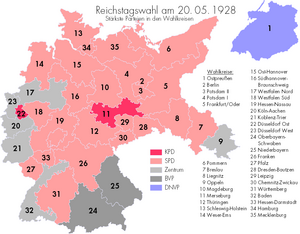German federal election, 1928
|
|
|||||||||||||||||||||||||||||||||||||||||||||||||||||||||||||||||||||||||||||||||||||||||||||
|---|---|---|---|---|---|---|---|---|---|---|---|---|---|---|---|---|---|---|---|---|---|---|---|---|---|---|---|---|---|---|---|---|---|---|---|---|---|---|---|---|---|---|---|---|---|---|---|---|---|---|---|---|---|---|---|---|---|---|---|---|---|---|---|---|---|---|---|---|---|---|---|---|---|---|---|---|---|---|---|---|---|---|---|---|---|---|---|---|---|---|---|---|---|
|
|||||||||||||||||||||||||||||||||||||||||||||||||||||||||||||||||||||||||||||||||||||||||||||
|
All 491 seats in the Reichstag 246 seats needed for a majority |
|||||||||||||||||||||||||||||||||||||||||||||||||||||||||||||||||||||||||||||||||||||||||||||
| Turnout | 75.6% | ||||||||||||||||||||||||||||||||||||||||||||||||||||||||||||||||||||||||||||||||||||||||||||
|
|||||||||||||||||||||||||||||||||||||||||||||||||||||||||||||||||||||||||||||||||||||||||||||

Electoral map (in German)
|
|||||||||||||||||||||||||||||||||||||||||||||||||||||||||||||||||||||||||||||||||||||||||||||
|
|||||||||||||||||||||||||||||||||||||||||||||||||||||||||||||||||||||||||||||||||||||||||||||
Federal elections were held in Germany on 20 May 1928. The Social Democratic Party (SPD) remained the largest party in the Reichstag after winning 153 of the 491 seats. Voter turnout was 75.6%.
The only two parties to gain significantly were the SPD, who polled almost a third of votes, and the Communist Party of Germany, completing a thorough victory of the left-wing. However, although the SPD now had 153 seats, they still failed to gain a clear majority, resulting in another coalition government led by Hermann Müller. Following his appointment, Müller, who had already been Germany's Chancellor for 4 months in 1920, created a Grand Coalition of members of the SPD, German Democratic Party, Centre Party and the German People's Party. The coalition was plagued by internal divisions right from the beginning, with each party more concerned with their self-interest than the interest of the government and eventually Müller asked President Paul von Hindenburg for emergency powers. When Hindenburg refused, Müller resigned, marking the end of the 'last genuinely democratic government of the Weimar Republic' on 27 March 1930.
The recently reformed Nazi Party contested the elections after the ban on the party was lifted in 1925. However, the party received less than 3% of the vote and won just 12 seats in the Reichstag. This was due to the fact that Adolf Hitler, who had been incarcerated in Landsberg prison for his involvement in the Beer Hall Putsch until Christmas 1924, had concentrated on re-establishing himself as the leader of the Nazi Party following his release rather than on the party's electability.
...
Wikipedia





